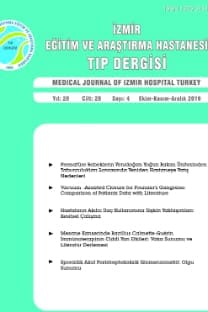AİLESEL AKDENİZ ATEŞİ TANISI İLE İZLENEN OLGULARIN ÜST GASTROİNTESTİNAL SİSTEM BULGULARININ DEĞERLENDİRİLMESİ
EVALUATION OF UPPER GASTROINTESTINAL SYSTEM SYMPTOMS OF THE FAMILIAL MEDITERRANEAN FEVER DIAGNOSED PATIENTS
___
- 1. Aksentijevich I, Kastner DL. Genetics of monogenic autoinflammatory diseases: past successes, future challenges. Nature Reviews Rheumatology 2011; 7(8): 469-78.
- 2. Ozen S, Bilginer Y. A clinical guide to autoinflammatory diseases: familial Mediterranean fever and next-of-kin. Nature Reviews Rheumatology 2014; 10(3): 135-47.
- 3. Group TFS. Familial Mediterranean fever (FMF) in Turkey: results of a nationwide multicenter study. Medicine 2005; 84(1): 1-11.
- 4. Consortium FF. A candidate gene for familial Mediterranean fever. Nature genetics 1997; 17(1): 25.
- 5. Consortium IF. Ancient missense mutations in a new member of the RoRet gene family are likely to cause familial Mediterranean fever. Cell. 1997; 90(4): 797-807.
- 6. Chae JJ, Wood G, Masters SL, Richard K, Park G, Smith BJ, et al. The B30. 2 domain of pyrin, the familial Mediterranean fever protein, interacts directly with caspase-1 to modulate IL-1β production. Proceedings of the National Academy of Sciences. 2006; 103(26): 9982-7.
- 7. Livneh A, Langevitz P. Diagnostic and treatment concerns in familial Mediterranean fever. Best Practice & Research Clinical Rheumatology. 2000; 14(3): 477-98.
- 8. Stojanov S, Kastner DL. Familial autoinflammatory diseases: genetics, pathogenesis and treatment. Current Opinion in Rheumatology. 2005; 17(5): 586-99.
- 9. Samuels J, Ozen S. Familial Mediterranean fever and the other autoinflammatory syndromes: evaluation of the patient with recurrent fever. Current Opinion in Rheumatology. 2006; 18(1): 108-17.
- 10. Majeed H, Barakat M. Familial Mediterranean fever (recurrent hereditary polyserositis) in children: analysis of 88 cases. European Journal of Pediatrics. 1989; 148(7): 636-41.
- 11. Mor A, Gal R, Livneh A. Abdominal and digestive system associations of familial Mediterranean fever. The American Journal of Gastroenterology. 2003; 98(12): 2594-604.
- 12. Ben-Chetrit E, Levy M. Familial mediterranean fever. The Lancet. 1998; 351(9103): 659-64.
- 13. Galeazzi M, Gasbarrini G, Ghirardello A, Grandemange S, Hoffman H, Manna R et al. Autoinflammatory syndromes. Clinical and experimental rheumatology. 2006; 24(1): S79.
- 14. Ozen S. Familial Mediterranean fever: revisiting an ancient disease. European Journal of Pediatrics. 2003; 162(7-8): 449- 54.
- 15. Tunca M, Ben-Chetrit E. Familial Mediterranean fever in 2003. Pathogenesis and management.Clinical and Experimental Rheumatology. 2003; 21(4; SUPP/30): S49-S52.
- 16. Tunca M, Ozdogan H. Molecular and genetic characteristics of hereditary autoinflammatory diseases. Current Drug TargetsInflammation & Allergy. 2005; 4(1): 77-80.
- 17. Van der Hilst J, Simon A, Drenth J. Hereditary periodic fever and reactive amyloidosis. Clinical and Experimental Medicine. 2005; 5(3): 87-98.
- 18. Ben-Chetrit E, Levy M, editors. Colchicine: 1998 update. Seminars in Arthritis and Rheumatism; 1998; 28(1): 48-59.
- 19. Goldfinger S. Colchicine for familial Mediterranean fever. The New England Journal of Medicine. 1972; 287(25): 1302.
- 20. Ben-Chetrit E, Levy M. Reproductive system in familial Mediterranean fever: an overview. Annals of the Rheumatic Diseases. 2003; 62(10): 916-9.
- 21. Livneh A, Langevitz P, Zemer D, Zaks N, Kees S, Lidar T et al. Criteria for the diagnosis of familial Mediterranean fever Arthritis Rheum 1997; 40(10): 1879-85.
- 22. Price A, Misiewicz J. Sydney classification for gastritis. The Lancet. 1991; 337(8734): 174.
- 23. kman S, Yazici S, Ozturk C. Gastrointestinal evaluation in colchicine-treated familial Mediterranean fever patients with chronic abdominal pain: Cases series. Archivos Argentinos de Pediatria. 2018; 116(5): e649-e54.
- 24. Ekinci RMK, Balcı S, Akay E, Tumgor G, Dogruel D, Altintas DU et al. Frequency of functional gastrointestinal disorders in children with familial Mediterranean fever. Clinical Rheumatology. 2019; 38(3): 921-6.
- 25. Sağ E, Demir F, Saygın İ, Kalyoncu M, Çakır M. Endoscopic Findings of Children with Familial Mediterranean Fever. Pediatric Gastroenterology, Hepatology &Nutrition. 2018; 21(4): 271-7.
- 26. Gurkan OE, Dalgic B. Gastrointestinal mucosal involvement without amyloidosis in children with familial Mediterranean fever. Journal of Pediatric Gastroenterology and Nutrition. 2013; 57(3): 319-23
- 27. Ozaltin F, Bakkaloglu A, Saltik IN, Demir H, Duzova A, Bulun A, et al. Helicobacter pylori infection in Turkish children with familial Mediterranean fever: is it a cause of persistent inflammation? Clinical Rheumatology. 2004; 23(2): 186-7.
- 28. Kelesoglu FM, Aygun E, Okumus NK, Ersoy A, Karapınar E, Saglam N, et al. Evaluation of subclinical inflammation in familial Mediterranean fever patients: relations with mutation types and attack status: a retrospective study. Clinical Rheumatology. 2016; 35(11): 2757-63.
- 29. Uslu N, Yüce A, Demir H, Saltik-Temizel IN, Usta Y, Yilmaz E et al. The association of inflammatory bowel disease and Mediterranean fever gene (MEFV) mutations in Turkish children. Digestive Diseases and Sciences 2010; 55(12): 3488-94.
- 30. Beşer ÖF, Çokuğraş FÇ, Kutlu T, Erginöz E, Gülcü D, Kasapçopur Ö et al. Enflamatuar bağırsak hastalığı tanılı Türk çocuklarında Ailevi Akdeniz Ateşi birlikteliği. Türk Pediatri Arşivi 2014; 49(3): 198-202.
- 31. Tufan A, Mercan R, Tezcan ME, Kaya A, Bitik B, Ozturk MA et al. Enthesopathy in patients with familial Mediterranean fever: increased prevalence in M694 V variant. Rheumatology International 2013; 33(8): 1933-7.
- ISSN: 1305-5151
- Başlangıç: 1995
- Yayıncı: İzmir Bozyaka Eğitim ve Araştırma Hastanesi
PANSİTOPENİ / BİSİTOPENİSİ OLAN ÇOCUKLARIN KLİNİK VE ETİYOLOJİK AÇIDAN DEĞERLENDİRİLMESİ
CANLI VERİCİLİ BÖBREK NAKLİ DONÖRLERİMİZİN UZUN DÖNEMLİ TAKİP SONUÇLARI
DİFTERİ-TETANOZ AŞISI SONRASI GELİŞEN GUİLLAİN- BARRÉ SENDROMU
Mehmet Uğur BİLGİN, Noyan KOROĞLU, Zeki TUNCEL TEKGÜL
Mine Şebnem KARAKAN, Beyza ALGÜL DURAK
THE EFFICACY OF HYDROXYCHLOROQUINE IN HOSPITALIZED COVID-19 POSITIVE PATIENTS
Şükran KÖSE, Gözde DERVİŞ HAKİM, Melda TÜRKEN, Pelin ADAR, Sabri ATALAY, Kamil MERT, Bengü Gireniz TATAR
Abdullah DURHAN, Abdullah ŞENLİKC, Rıfat BEZİRC, Marlen SÜLEYMAN, Koray KOŞMAZ, Yusuf Murat BAĞ, Ümit MERCAN, Mevlüt Recep PEKÇİC
COVID-19 TANISI ALMIŞ İLERİ YAŞTAKİ HASTALARIN KLİNİK ÖZELLİKLERİ VE İZLEM SONUÇLARI
Şebnem ÇALIK, İsmail DEMİR, Özden YILDIRIM AKAN, Selin YALINÇ, Oktay BİLGİR
HASTANEYE YATAN COVID-19 POZİTİF HASTALARDA HİDROKSİKLOROKİNİN ETKİNLİĞİ
Bengü GİRENİZ TATAR, Sabri ATALAY, Melda TÜRKEN, Pelin ADAR, Gözde DERVİŞ HAKİM, Şükran KÖSE, Kamil MERT
Gizem SARI, Nafiye URGANCI, Gül ÖÇELİK, Merve USTA
MEME KANSERİ GELİŞİMİNDEKİ PROGNOSTİK FAKTÖRLER: ERKEN VE GEÇ EVRE KANSERLERİN KARŞILAŞTIRILMASI
